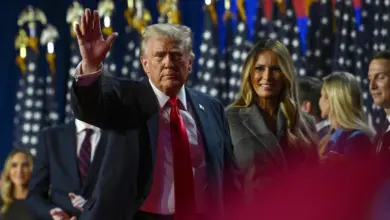It doesn’t take an especially astute observer of public affairs to realize that political mobility in Egypt is entering a new phase as figures like Mohamed ElBaradei and Amer Moussa become more involved in political work.
Their recent statements on the current political climate, interpreted as a desire to run for the presidency in the upcoming elections, have sparked continuing controversy.
Interestingly, neither of the two men had shown interest in local political activities or been involved in them at any level. In fact, both figures started at the top of international and regional organizations, which makes the Egyptian case unique.
Although both are veteran diplomats, they have markedly different political and intellectual viewpoints, emanating from the fact that one of them comes from outside the regime whereas the other is essentially part of it.
ElBaradei has never belonged to the regime. Suffice to say the Egyptian state refused to nominate him for director general of the International Atomic Energy Agency, and officially nominated another Egyptian candidate for the position.
Amr Moussa is a product of the regime and served as its foreign minister for ten years before President Mubarak nominated him for the position of secretary general of the Arab League. Unsurprisingly, their statements on the current political landscape reflect divergent visions and approaches, in both content and form.
A careful reading of their statements and attitudes shows that Amr Moussa’s connection with the regime has influenced his statements, which came out rather ambiguous and complimentary in nature. ElBaradei, on the other hand, seemed more outspoken, and so his statements were more straightforward and, naturally, more convincing.
However, the aforementioned points shouldn’t make us fail to see how the two figures do, in effect, agree on some fundamental facts:
1) Egypt, as a state, society and regime, is facing a comprehensive, deeply-rooted crisis whose most important manifestations include the deterioration in the level of education and medical care; the spread of unemployment, poverty and illiteracy; the wide gap between the rich and poor; and the deterioration of Egypt’s regional and international status. These are all alarming phenomena that seem likely to worsen, threatening the country with a state of complete chaos.
2) In order to end this crisis, practical national solutions are required to launch a project of modernization. It’s not about one president stepping into the shoes of another or one regime replacing another. Such a solution necessitates a minimum level of agreement among the diverse political and intellectual elite on the new rules of the political game, a game that vests power in the people who choose their representatives in free elections supervised by the international community.
3) A distinction must be made between long term solutions, which require a constitution put in place by experts, and short term solutions. The short term solution entails an immediate amendment of Articles 76, 77, and 88 of the Constitution in order to allow any citizen satisfying the objective conditions to run for presidential elections without obstacles. The presidential term should be restricted to two successive terms, and the judiciary should be allowed to fully supervise the electoral process, starting with electoral registers and ending with the announcement of the result.
Amr Moussa was keen on emphasizing that President Mubarak has a popular base of support that guarantees him an easy win. Such a declaration might imply that Moussa is not planning to nominate himself. However, such a viewpoint, with which many might disagree, wouldn’t be anymore valid if elections were carried out after the previously mentioned articles are amended.
Nobody is calling on Mubarak to back out of the elections, though many still believe there is no good reason why he should run for the coming elections at such an age. Again nobody is urging the National Democratic Party not to nominate Gamal Mubarak, though many believe he is not suitable for the position for logical reasons. What everyone is calling for, however, is holding the upcoming legislative and presidential elections after the required constitution amendments are introduced.
If the elections are conducted without first introducing such changes, then the NDP will be able to snatch an overwhelming majority of seats in the People’s Assembly and the Shura Council, setting the scene for the NDP candidate, whoever he may be, to win the presidential elections.
If Mubarak stays for another term, then the amendments will be put off for another six year, until 2017. However, the introduction of Gamal Mubarak will put such amendments on the back burner for a good 40 years!
It’s a grave mistake to preoccupy ourselves with talk about potential candidates. Such a debate is pointless, for as I said before, if no changes are made to the constitution, then it’s either Mubarak the father or Mubarak the son.
Therefore, I urge the Egyptian elite to back the calls of ElBaradei and Moussa to amend the three articles. It’s true they weren’t the first to call for such amendments, but their calls add credibility to a demand that everyone agrees is a means to open the way for peaceful change.
In fact, many of the groups creating the current state of political mobility have issued statements calling for such amendments and are presently having them signed by the major political and intellectual symbols in Egypt.
If they manage to gather the signatures of 500 major politicians, novelists, poets, and artists who belong to diverse political and ideological backgrounds, and then hold a conference to voice these demands, they are undoubtedly going to stir the stagnant waters.
Only when the door to nominations is open to everyone should we start to compare nominees and their platforms.
Translated from the Arabic Edition.




